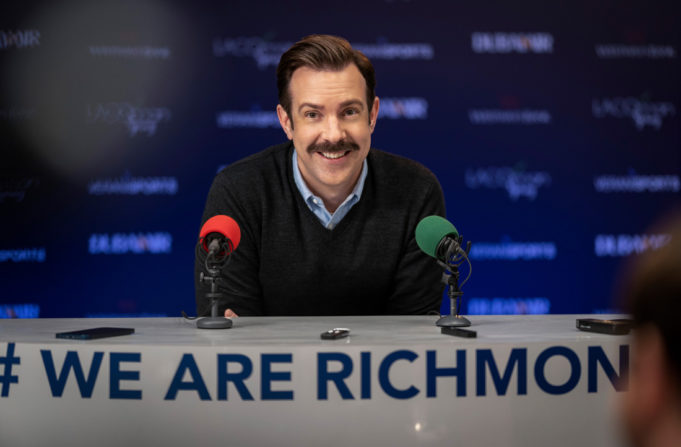NBC and Jason Sudeikis invented the character of Ted Lasso for a series of TV spots promoting the U.S. network’s coverage of English Premier League soccer, conceiving Ted as an American idiot with zero knowledge and oodles of unearned confidence. To make this character work in a TV comedy series would take some fleshing out, and that’s what Ted Lasso has done. As it’s about to wind up its second season on Apple TV+, it’s mostly delightful.
Ted is an indefatigably cheerful NCAA title-winning coach of the American version of football who, despite his complete lack of experience with soccer at any level, is engaged as the manager of AFC Richmond, an EPL team based in West London. Richmond’s new owner, Rebecca Welton (Hannah Waddingham), won the club in a bitter divorce settlement and hired Ted to fail spectacularly as a way of getting back at her cheating ex. During the first season, Ted won some battles getting his players and the press on his side, but he didn’t win enough games, and the team was relegated to the second tier of English soccer, which is called the Championship. (I remember being confused when I learned that little fact, much like Ted.) In the second season, he failed to move Richmond back up to the top flight, but the team made an improbable run to the FA Cup semifinal.
Ted may not know much about his new sport, but he is a genius at interpersonal skills (or man-management, as the British call it). When Nigerian attacker Sam Obisanya (Toheeb Jimoh) is underperforming because he’s missing home, Ted throws a birthday party for him and finds him some snacks from his homeland. Aging, ornery midfield general Roy Kent (Brett Goldstein) seems like the last person who would buy into Ted’s upbeat attitude, and yet it’s convincing when he does. Ted coaches players from more than 10 different countries, which is standard for a Premier League outfit, and the show doesn’t undersell the challenges of knitting them into a cohesive team.
As a longtime soccer fan, I can say the show’s references to the sport are always on point — I laughed out loud when someone mentioned Harry Redknapp openly campaigning for Ted’s job, because that is exactly what the real-life Redknapp would do. Roy’s brief, obscenity-filled stint as a TV pundit points up the vapidity of British media’s soccer coverage. When Sam finds out that the club’s Emirati corporate sponsor is despoiling the environment in Nigeria, he’s facing issues that real-life soccer players face (and the show is staring straight at Emirati-owned teams like Manchester City and Paris St.-Germain). He launches a protest that results in Richmond losing its sponsor, and I wish the show hadn’t resolved that subplot so easily.
The cast has some crackers in it: Goldstein (who also wrote one of the episodes) is excellent as an undiplomatic guy who’s out of touch with his emotions, and Juno Temple plays an actress/model who realizes she’s too old to keep living a soccer groupie’s life and becomes Richmond’s head of marketing. I’ve been a fan of Temple’s acting from way back, and it’s gratifying to see her be excellent in something that many people see.
It’s hard for a TV show to portray a nice and decent main character without him seeming manic or just dull. The comedy mostly avoids this by showing us Ted in his different moods, including his sadness over a disintegrating marriage in Kansas and his occasional panic attacks when Richmond has success. The show could potentially break new ground in depicting a soccer coach with mental troubles, but I’m disappointed in the revelation near the end of Season 2. It’s more interesting if Ted is simply a natural optimist than if his attitude is rooted in childhood trauma. People have complained that the show is too nice, and rather than focus on Ted’s backstory, I’d like to see Ted Lasso put him next to a player who’s a genuine malcontent or a rival coach who tries to bully him or experience a massive outpouring of racism like the one that greeted the Black English players after the Euro 2020 final. (Sudeikis expressed support for those players in real life, so maybe that’s a plotline for Season 3.)
In Britain, the show has been taken as an answer to the too many footie fans who think that coaches aren’t doing anything if they’re not screaming their lungs out on the touchline. (English soccer is home of Sir Alex Ferguson’s “hair dryer treatment,” in which the coach yells at a player so loud that he dries the player’s hair after he’s come out of the shower.) I couldn’t help thinking of Liverpool’s run in the Champions League in 2019, led by Jürgen Klopp, a manager whose positivity rivals Ted Lasso’s. When Liverpool needed a huge comeback at home to beat Barcelona, Klopp and his coaches noticed that Barcelona’s defenders tended to check out mentally when waiting for their opponents to set up corner kicks and free kicks. He told the ball boys at Liverpool’s home stadium to get the ball to the players immediately when the home team had a corner. They did, and one quickly taken corner caught Barça’s defenders napping, resulting in the winning goal for Liverpool. The ball boys got to feel like part of this huge victory for the club. This is how you run an organization, by making everyone down to the ball boys feel like they’re valued. Ted Lasso knows this secret, and Ted Lasso is best when it’s showing that play out.












